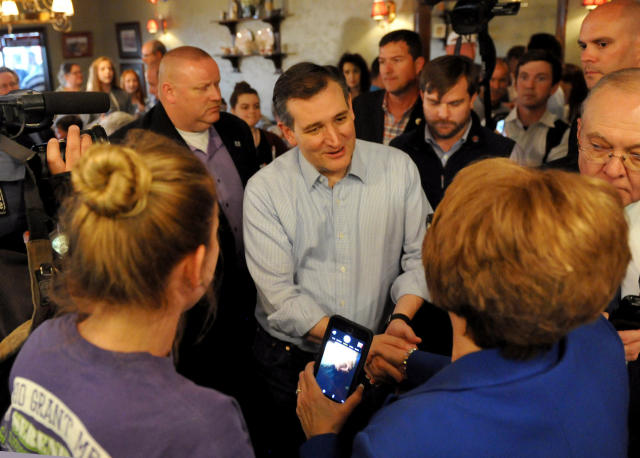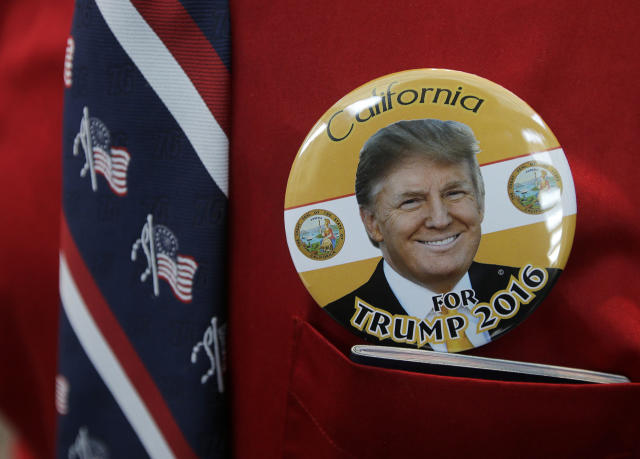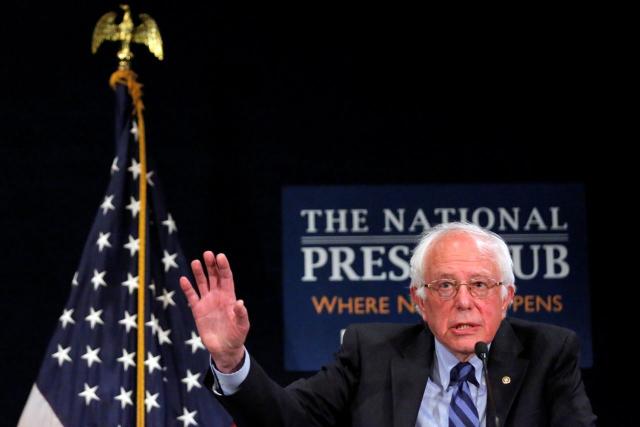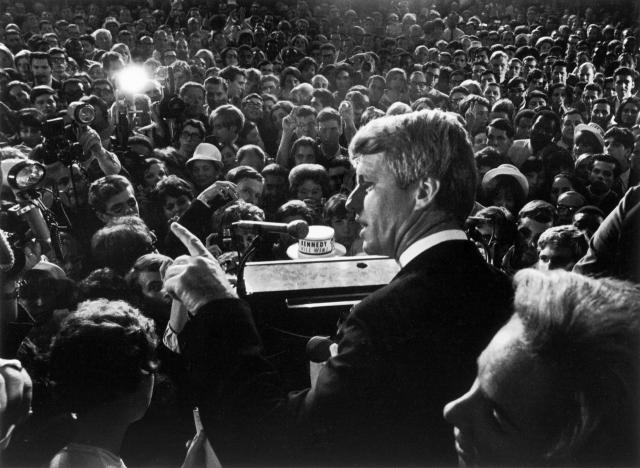
This article is more than
9 year oldUnconventional is Yahoo News’ complete guide to what could be the craziest presidential convention — or conventions — in decades. Here’s what you need to know today.
You’ve probably heard the hype: The most important GOP contest left on the calendar is tomorrow’s Indiana primary.
Texas Sen. Ted Cruz has said as much. “Make no mistake, Indiana is absolutely pivotal,” Cruz told supporters in a fundraising email. “If [Donald] Trump wins all the delegates in Indiana, his nomination could be all but determined.”
Trump himself seems to agree. “If we win Indiana, it’s over,” he said Sunday in Terre Haute.
Even Unconventional has gotten in on the act. “So Super ‘Acela’ Tuesday wasn’t exactly a nail-biter,” we wrote last week. “Don’t worry, though: Next Tuesday should more than make up for it.”
Given Donald Trump’s recent streak of landslide victories, the implication is clear. The only way Cruz will still have a shot at the nomination is if he wins Indiana. Indiana matters!
But what if we were wrong? What if Indiana can’t save Cruz?
To be sure, a Cruz comeback in the Hoosier State would provide him with some momentum heading into the final stretch of mostly Western primaries, including make-or-break California.
But momentum and media narratives aside, three recent delegate developments — developments that have yet to receive a ton of attention in the press — suggest that a Cruz win in Indiana would not pack as strong a punch as the hype would have you believe.
The first of these developments is that Trump seems to have emerged f-rom last Tuesday’s Pennsylvania primary with more delegates than anyone expected.
Trump, of course, won the Keystone State’s 17 pledged delegates, which always go to the statewide winner. But Pennsylvania holds what’s known as a loophole primary: The state’s other 54 delegates — three f-rom each congressional district — are unbound, meaning they can vote for whomever they want at the convention. In the other GOP loophole states, Illinois and West Virginia, unbound delegate candidates are listed on the ballot alongside their preferred candidate, so at least voters have some idea which presidential wannabe they’re helping with their votes. That’s not the case in Pennsylvania. The delegate ballot is just a list of names, many of them unrecognizable.
Before, the thinking was that Trump would win only a handful of unbound delegates in Pennsylvania’s weird luck-of-draw system. But he wound up winning at least 41 of them,according to the New York Times’ Jeremy Peters. As a result, Trump may no longer “need” a win in Indiana to hit the magic 1,237 mark before Cleveland.
Here’s Nate Cohn of the Upshot explaining how Pennsylvania’s unbound delegates have changed Trump’s math:
“My [previous] analysis and that of others included only pledged delegates; the 54 unpledged delegates were held out of Mr. Trump’s path to 1,237. If he has indeed moved many of those delegates off the sideline and into his territory, it obviates the necessity for him to win Indiana, which is worth 57 delegates (30 delegates to the statewide winner and three delegates to the winner of each of nine congressional districts). He would still need a comfortable victory in California — enough to win about 130 of the state’s 172 delegates in the event of a loss in Indiana. He could bring that figure as low as 115 with good outcomes in West Virginia, Oregon, Washington and New Mexico, or with a few additional districts in Indiana.
The 130-delegate target in California is achievable. The state awards its delegates on a winner-take-all basis statewide and by congressional district, so Mr. Trump would need an overall victory (13 delegates) and wins in about 40 of the state’s 53 congressional districts to pull it off. Even a modest popular vote victory could do the trick. In 2008, John McCain won 48 of California’s 53 congressional districts with a 7.5-point margin of victory in the popular vote.
The second development that could blunt the impact of a Cruz win in Indiana involves the state’s new delegate slate. Assume Cruz finishes first in Indiana. Assume Trump failsto clinch the nomination on the first ballot in Cleveland as a result. Even then, Cruz isn’t guaranteed to retain the support of Indiana’s delegation on subsequent ballots (when everyone is free to vote his or her conscience). Why? Because unlike other states whe-re Cruz’s master delegate team has successfully gotten its pro-Cruz sleeper delegates elected — like Arizona and Virginia over the weekend — Indiana’s system is top-down rather than bottom-up; party leaders basically pick the delegates themselves.

Ted Cruz at the Pie Pan in Evansville, Ind., April 29. The event was one of Cruz’s “retail stops.” (Photo: Jason Clark/Evansville Courier & Press via AP)
And guess who most of these Indiana insiders support?
(Hint: It’s not Ted Cruz.)
“Indiana’s 57 delegates appear to lean heavily in the direction of John Kasich, the governor of neighboring Ohio,” reports Matthew Tully of the Indianapolis Star. “Kasich may not win the Indiana primary, but his more middle-of-the-road manner has apparently won the hearts (or at least the minds) of a majority of Indiana’s Republican delegates.”
The third development worth noting here is that even Cruz’s sleeper delegates — the ones who are supposed to switch to Cruz on a second or third ballot in Cleveland, thereby boosting him to victory — aren’t feeling particularly loyal to the senator f-rom Texas these days. Here’s the Times’ Jeremy Peters again:
In North Dakota, whe-re the Cruz campaign declared victory after the state Republican convention on April 3 and declared that it had won “a vast majority” of the state’s 28 unbound delegates, Mr. Cruz’s support appears to be weakening. In interviews, delegates said he really had only about a dozen firm commitments to begin with, and some of them appear to be wavering as he falls farther behind Mr. Trump.
And in states across the South, which was supposed to be Mr. Cruz’s bulwark, some delegates are now echoing a growing sentiment inside the Republican Party: a sense of resignation to the idea that Mr. Trump will be their standard-bearer.
“It turns out,” as Peters puts it, “that delegates — like ordinary voters — are susceptible to shifts in public opinion.” Every time Trump wins another landslide, Cruz’s support among the party’s 2,472 convention delegates softens, threatening his hopes of overtaking Trump in a floor fight.
Add it all up, and Cruz’s chances of saving himself with a win Tuesday start to look pretty slim. Even if the Texan takes Indiana — and even if his victory triggers multiple ballots in Cleveland by preventing Trump f-rom hitting 1,237 — Indiana’s delegates wouldn’t necessarily cling to Cruz in subsequent rounds of voting; they could flip to Kasich instead. Cruz’s sleeper delegates are also signaling that they might jump ship if Trump continues to dominate. And worst of all, Trump can now probably afford to lose Indiana without closing off his path to 1,237.
The outcome in Indiana is still a mystery at this point. One recent poll shows Trump with a 15-point lead; another shows Cruz ahead by 16. Most are somewhe-re in between, with Trump maintaining a modest edge on average.
But the outcome of the GOP nominating contest as a whole is looking increasingly clear — no matter what happens Tuesday in the Hoosier State.
_____

A Trump supporter wears a button at the California Republican convention on April 29. (Photo: Jeff Chiu/AP)
By Holly Bailey
After Tuesday night’s Indiana Republican presidential primary, the focus will shift to the next big prize in the GOP race: California, whe-re 172 delegates are up for grabs on June 7. Even if Donald Trump triumphs in Indiana, the real estate mogul will still need to win in California, the final contest of the primary season, if he is to capture the 1,237 delegates needed to clinch the GOP nomination and avoid a contested party convention in Cleveland in July.
That means California’s GOP primary will actually matter, and that’s big news for the state’s 4.7 million registered Republicans — the most in any other state besides Texas. But California is a complicated battlefield, whe-re 159 delegates are awarded to candidates who win the majority of votes in each of state’s 53 congressional districts.
The top vote-getter in each district will get three delegates — no matter if it is in California’s 48th Congressional District, home to Republican-rich Orange County, or House Minority Leader Nancy Pelosi’s heavily Democratic district encompassing San Francisco. And that means Trump and his remaining rivals, Texas Sen. Ted Cruz and Ohio Gov. John Kasich, will have to have a ground game everywhe-re, even in places whe-re there are few Republicans.
But adding to California’s complexity is the fact that 80 percent of Republicans vote by absentee ballot, a process that begins May 8. And according to former state Sen. Jim Brulte, chairman of the California Republican Party, that could potentially delay the process of figuring out which candidate emerges with the most delegates because absentee ballots merely need to be postmarked by June 7 to count. Under California law, election officials continue to count absentee ballots for at least a week beyond primary day, which could prove pivotal if the race does come down to every last vote, as some believe it might.
“I think we will know the winner on June 7,” Brulte told Yahoo News during a break at the California GOP convention, held in Burlingame, near San Francisco, last weekend. “But there’s a chance we might not. … It’s all a little complicated.”
_____
A little over a month before California’s Republican presidential primary, Donald Trump began his official wooing of party delegates Friday, headlining a kickoff lunch at the state’s annual GOP convention. But Trump’s appearance was nearly derailed by massive protests outside the Hyatt Regency hotel, whe-re the convention was being held. More than a thousand protesters blocked surrounding streets and, at one point, knocked down police barricades as they attempted to storm the building before Trump’s speech. Yahoo’s Jen Rogers interviewed Yahoo News political consultant Brian Goldsmith about the developments.
_____

Bernie Sanders at a news conference at the National Press Club in Washington, D.C., on Sunday. (Photo: Carlos Barria/Reuters)
Bernie Sanders spoke to reporters in Washington, D.C., yesterday about his plans going forward. Yahoo News Senior Editor Dylan Stableford reports:
Bernie Sanders held a press conference in Washington, D.C., on Sunday to mark one year since launching his presidential bid, vowing to take his fight for the Democratic nomination to the superdelegates currently supporting frontrunner Hillary Clinton.
“It’s a tough road to climb,” Sanders told reporters at the National Press Club, but “not an impossible” one.
The Vermont senator said that those superdelegates supporting the former secretary of state ought to rethink their pledge — particularly in states whe-re he won handily.
“I would ask the superdelegates to respect the wishes of the people of those states,” Sanders said.
Overall, Clinton has the support of 520 superdelegates, while Sanders, the self-described democratic socialist, has “all of 39” — despite winning 17 primaries and caucuses “in every part of the country.”
Sanders pointed out that although he won Washington state’s Democratic caucuses by 46 points (73 percent to 27 percent) and 25 of the state’s 36 pledged delegates, Clinton has the support of 10 of Washington’s Democratic unpledged superdelegates.
“We have zero,” he said. “Obviously, we are taking on the entire Democratic establishment.”
Clinton’s lead over Sanders in pledged delegates is 1,645 to 1,318.
“Let’s be clear,” Sanders said. “It is virtually impossible for Secretary Clinton to reach the majority of convention delegates by June 14 — the end of the primary season — with pledged delegates alone. She will need superdelegates to take her over the top at the convention in Philadelphia. In other words, it will be a contested convention.”
Which is why the Sanders campaign is prepared to take its case — and its message — through the presidential primaries in California and Washington, D.C., in June and to the Democratic National Convention in Philadelphia in July.
And while Sanders reiterated to reporters that he would do everything in his power to stop Trump f-rom becoming president if he ultimately loses the Democratic nomination, he was in no mood to talk about his campaign’s “legacy.”
“I hope my legacy will be that I was a very good president,” Sanders said.
Does Sanders actually think he will be the next U.S. president?
Our best guess: No, he does not.
The senator f-rom Vermont is a smart man.
He knows that Clinton is exceeding her delegate targets and that she is well on her way to winning a majority of pledged delegates before the convention in Philadelphia.
He knows that Clinton leads him by 3,167,708 popular votes and that asking party elites to overturn that result is plainly incompatible with his passionate message about a grassroots “political revolution.”
He knows that Clinton didn’t push for a contested convention in 2008 even though she won that year’s popular vote and was closer to Barack Obama in the delegate count than Sanders is to Clinton now.
He knows that his fundraising haul plummeted by 40 percent f-rom March to April and that he just laid off hundreds of staffers.
He knows that a comeback would be unprecedented.
But Sanders also knows that he is one of the strongest runners-up in modern primary history. He has 8,967,401 votes and 1,357 delegates. He has raised $182 million. And he could still win several of the upcoming primary and caucus states, including the last and the largest, California.
He wants something in return.
Sanders knows that his campaign is worth more than a silver medal. Does he know that it’s not worth a presidential nomination? Probably. But maybe it is worth “ the strongest progressive agenda that any political party has ever seen.”
As Sanders himself put it after losing four out of five Eastern primaries last Tuesday, “The people in every state in this country should have the right to determine who they want as president and what the agenda of the Democratic Party should be. … That’s why we are in this race until the last vote is cast. That is why this campaign is going to the Democratic National Convention in Philadelphia with as many delegates as possible to fight for a progressive party platform.” [Emphasis added]
Sanders knows that he can push for the “strongest” progressive platform at the convention in Philadelphia only if he has leverage. And he knows that his only leverage is his devoted base of supporters threatening to go “Bernie or bust” unless Clinton adopts as many of his ideas as possible.
Bernie Sanders isn’t delusional. He’s negotiating.
Do you agree? Or do you think Sanders still has a shot at the nomination? D-rop us a line on Twitter (@andrewromano) and let us know.
_____

https://twitter.com/bykowicz/status/726852145329393664
_____

Sen. Robert Kennedy and his wife, Ethel, at the Ambassador Hotel after his California primary victory and just prior to his assassination on June 5, 1968. (Photo: Bill Eppridge/The Life Picture Collection/Getty Images)
There’s been a lot of chatter about how this year’s California primary could decide the GOP presidential contest once and for all — something that hasn’t happened in a really long time. But how long has it actually been since a California primary actually mattered?
Not that long. In 2008, California rescheduled its traditional June primary for Super Tuesday, Feb. 5. On the Democratic side, Hillary Clinton secured a timely victory that helped to keep her afloat for a few more months; on the Republican side, John McCain all but clinched his party’s nomination.
Still, 2008 didn’t really affect the outcome of either race: Clinton wound up losing to Barack Obama in the end, and McCain probably would have won the GOP nod regardless. Plus this year’s primary is in June, not February.
The last contested June California primary was in 1984. When the time came for California to vote, Democratic Sen. Gary Hart of Colorado trailed former Vice President Wal-ter Mondale. But a sweep of the final primaries — California, New Jersey, South Dakota, New Mexico and West Virginia — would have put Hart back in the running at an open convention. Alas, Hart insulted New Jersey shortly before the primary and wound up losing there by 15 percentage points. Even though he won California, it wasn’t enough.
In 1968, California essentially decided the Democratic nominating contest. Robert F. Kennedy defeated Eugene McCarthy there on June 4, putting him on track to challenge Hubert Humphrey at the convention in Chicago. But that night Kennedy was shot by Palestinian militant Sirhan Sirhan; he died 26 hours later. Humphrey went on to win the nomination by a comfortable margin.
_____
For the latest data, make sure to check the Yahoo News delegate scorecard and pri